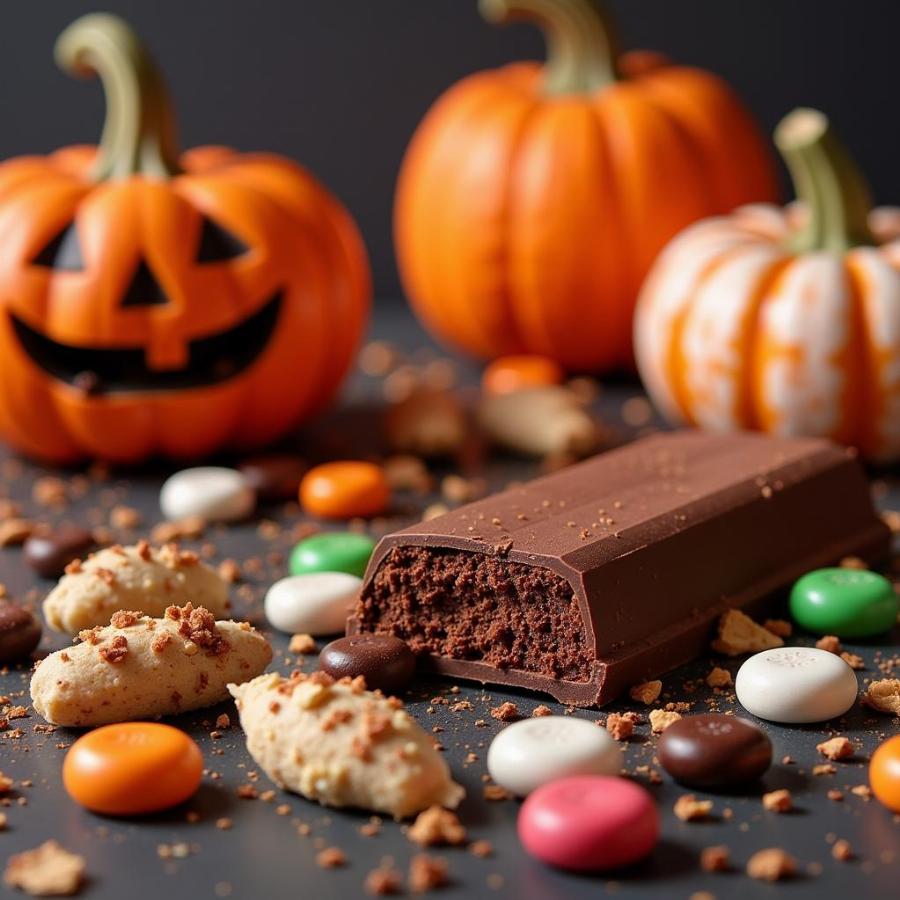Halloween is a time for spooky fun, but amidst the costumes and candy, it’s crucial to keep our furry friends safe. With Halloween skeletons popping up on lawns and trick-or-treaters ringing doorbells, it’s easy for our dogs to get spooked or even encounter potential dangers. This guide will provide you with practical tips to ensure a safe and enjoyable Halloween for both you and your canine companion.
Understanding Halloween Hazards for Your Dog
While we might revel in the spooky decorations and festive atmosphere, Halloween presents a unique set of challenges for our dogs. It’s important to remember that what seems fun to us can be stressful or even dangerous for them.
Navigating Decorations and Costumes
- Costumes: While adorable, not all dogs enjoy wearing costumes. Choose comfortable, well-fitting costumes that don’t restrict movement, breathing, or vision. Always supervise your dog while they are wearing a costume and be prepared to remove it if they seem distressed.
- Decorations: Curious pups might be tempted to play with or chew on decorations like fake cobwebs, glowing pumpkins, and inflatables. Securely fasten decorations out of your dog’s reach, and be mindful of any small parts they could ingest.
Trick-or-Treat Time Safety
The constant doorbell ringing and influx of strangers in costumes can be overwhelming for even the most social dogs.
- Secure Space: Create a safe and comfortable space away from the front door where your dog can relax without feeling overwhelmed. This could be a crate, a quiet room, or a designated area with their bed and toys.
- Door Management: Consider using a baby gate to prevent your dog from dashing out the door when it’s opened for trick-or-treaters. Train your dog to “go to their place” when the doorbell rings to further minimize stress.
Candy and Treats: A Recipe for Trouble
 Halloween Candy and Dogs
Halloween Candy and Dogs
Halloween candy poses a serious threat to dogs.
- Chocolate Toxicity: Chocolate contains theobromine, a compound that is toxic to dogs. Dark chocolate and baking chocolate are the most dangerous.
- Xylitol Danger: This artificial sweetener, commonly found in sugar-free gum and candy, can cause a rapid drop in blood sugar and liver failure in dogs.
- Keep Candy Out of Reach: Store all Halloween candy in airtight containers, well out of your dog’s reach. Be mindful of bags or bowls of candy left unattended.
Expert Insight: Dr. Emily Carter, Veterinarian
“Halloween is a busy time for veterinary emergency rooms,” says Dr. Emily Carter, a veterinarian specializing in canine care. “Many of these visits are preventable with a little extra precaution. Keep a close eye on your dog throughout the evening and contact your veterinarian immediately if you suspect your dog has ingested something toxic.”
Creating a Safe and Happy Halloween for Your Furry Friend
By following these simple guidelines, you can ensure that Halloween remains a festive and fun occasion for both you and your beloved pet. Remember, a little planning and awareness go a long way in preventing potential hazards and keeping your furry family member safe and sound.
Have a happy and safe Halloween!
FAQs: Halloween Safety for Dogs
Q: Can my dog eat pumpkin?
A: Yes, plain, cooked pumpkin (without added spices or sugars) can be a healthy treat for dogs. Pumpkin is a good source of fiber and vitamins.
Q: What should I do if my dog eats chocolate?
A: Contact your veterinarian or the ASPCA Animal Poison Control Center (APCC) immediately at (888) 426-4435.
Q: How can I help my dog feel less anxious on Halloween?
A: Create a safe space for them, consider using calming treats or pheromone diffusers, and provide plenty of positive reinforcement.
Looking for More Dog Care Tips?
- Check out our article on [Dog-Friendly Fall Activities](link to relevant article) for fun ways to enjoy the autumn season with your pup.
- Learn about [Keeping Your Dog Safe During Holiday Celebrations](link to relevant article) for year-round safety tips.
About Beaut Dogs
Beaut Dogs is your trusted source for all things dog-related. We’re dedicated to providing you with expert advice, helpful tips, and a wealth of information to help you provide the best possible care for your canine companion. For personalized guidance and answers to your specific questions, please don’t hesitate to contact us at [email protected].